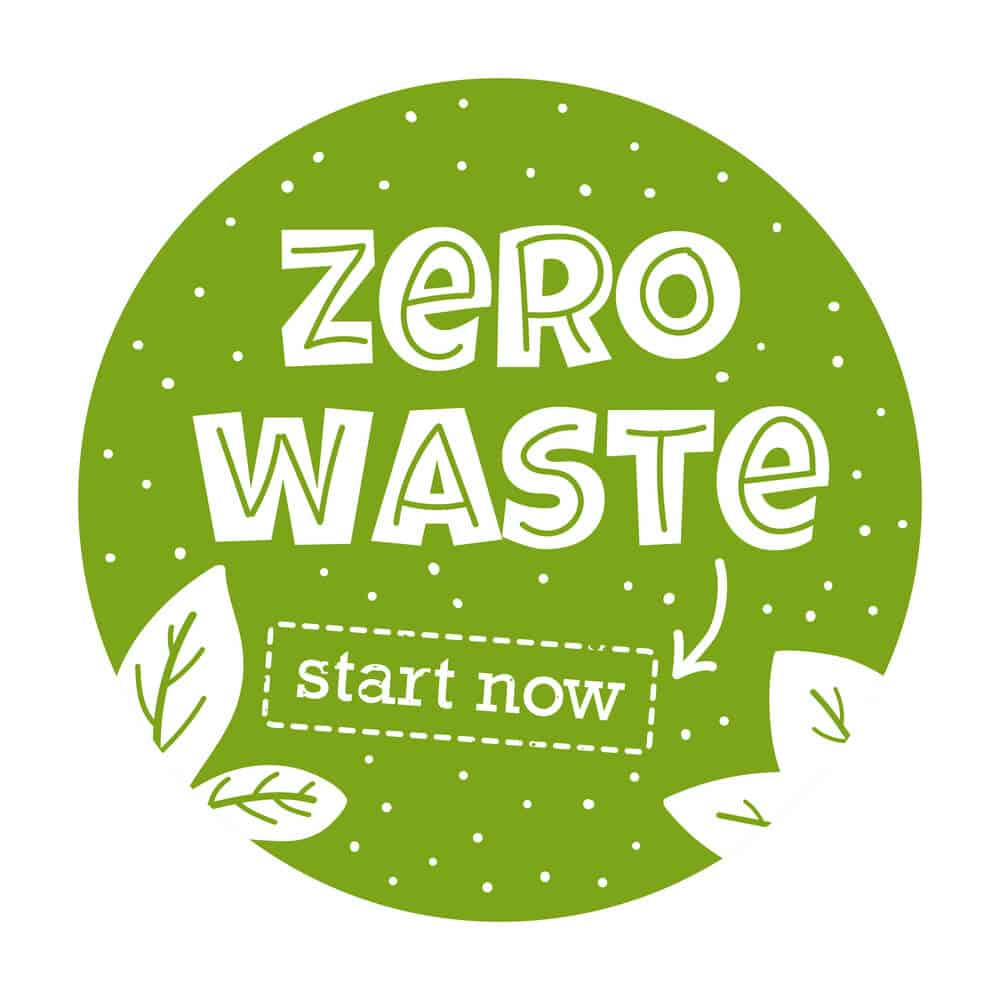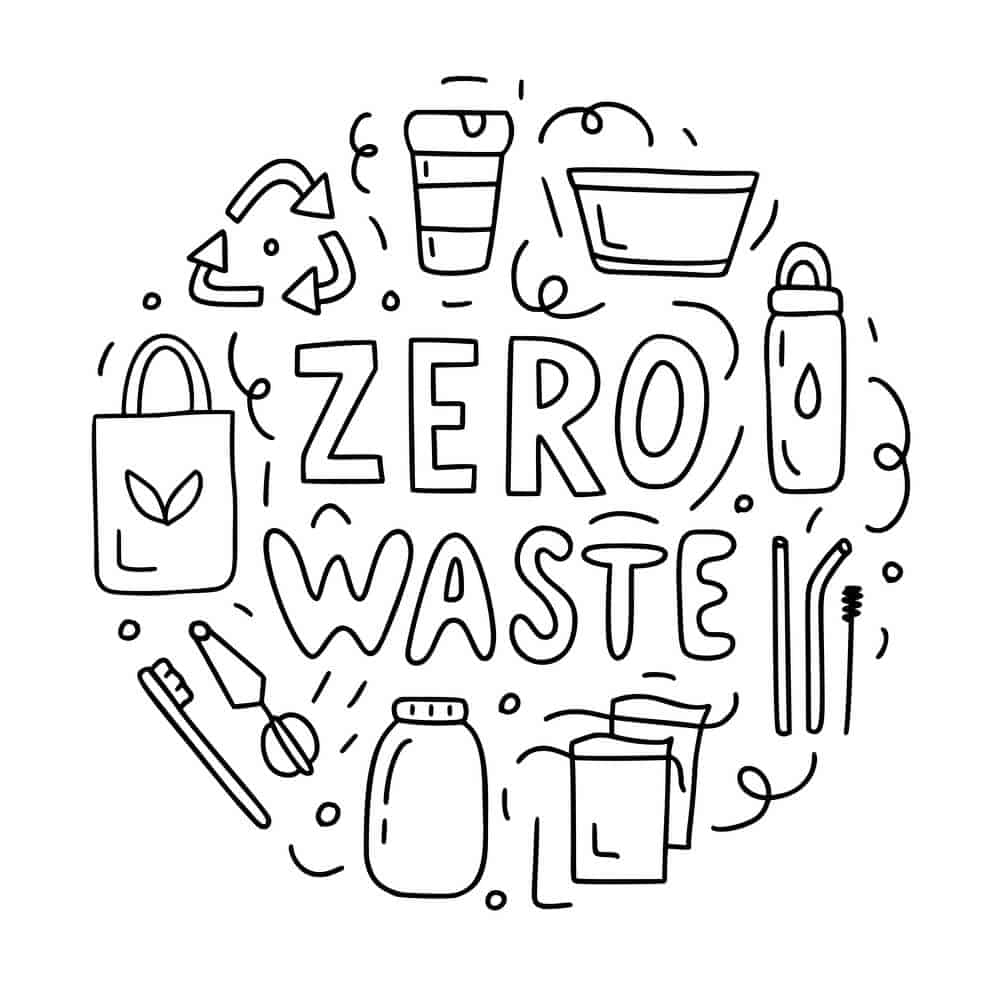What is Zero Waste?
Zero Waste is a lifestyle.
If you’ve found yourself reading this article, odds are, you’re interested in transitioning to a zero-waste lifestyle or may already be well on your way.
No matter where you are on your journey, we are here to guide you and offer advice to getting closer to producing zero waste.
The ultimate goal of zero Waste is to get as close to an entirely circular economy as we can – one where trash is nonexistent.
What we take from the earth is eventually returned with no fake additives or preservatives.
Zero Waste can seem intimidating.
How in the world can someone have NO waste?
To be honest, even the best zero-wasters still produce some waste! The goal is to produce as little trash as possible.
It doesn’t matter if you’re doing it imperfectly –over time, it will become second nature!
Zero Waste is not a trend! Sustainability has gained tremendous recognition over the past several decades, and people have begun to invest their time and money in preserving the planet and nature that calls it home.
In the capitalist world, we live in, and the environment has taken the most significant hit.
It’s often misconstrued that to be zero-waste, you have to have non-plastic, reusable items right away! This is false.
If you immediately go out and buy reusable bags, all-natural products with biodegradable packaging, reusable sandwich bags, and bamboo toothbrushes – what are you doing with all you had before? Most likely, you’re throwing it out or recycling what can be recycled, and still adding to the problem.
When I began my zero-waste journey, I fell for many of these fads.
I put off my transition because I thought I needed to go all in and couldn’t afford it.
One day I realized, I didn’t need to wait, and I could have started a long time ago!
What really opened my eyes was the most popular environmental phrase, “reduce, reuse, recycle.”
Many of us have recycling bins in our homes or return our recyclables to the proper facilities.
But why is it we focus on the latter of the three? Wouldn’t it make more sense to reduce the single-use plastics and items in the first place, re-use what Waste came from it, and then recycle it after its lifespan has truly reached its limit?
Once I had this realization, everything began to click.
I slowly began using up my products and replacing them as needed with more conscientious, sustainable purchases.
I chose glass jars over plastic or items with no packaging at all. All of my jars are able to be reused for food storage, pickling, bulk purchases, storage, crafts, the list goes on!!
You take your time making purchases all the time; Tossing up between two shirts, torn between this car or that, do you upgrade now or wait for a new release.
Why not apply that to making smart purchases all around? When looking for products, make a more intelligent buy.
Yes, it might be easier to buy a pack of 24 yogurts for quick snacks and lunch making; but buying the large container will not only save you money, but it will prevent 23 mini plastic yogurt containers and the closing foil, and the box, from taking up space in a landfill.
Instead, you’ll have one recyclable container and lid- which hey- you can even reuse!
Before we fall into the rabbit hole that is reduce, reuse, recycle, let us first talk about the why! Why spend extra time thinking about your purchases, why would you reuse your trash?
DID YOU KNOW:
· Water security is one of the world’s biggest challenges with nearly 4 billion people experiencing water scarcity
· It takes 15,000-20,000 liters of water to make one kilogram of beef
· A meat-free diet reduces the water footprint up to 55%, with an entirely vegan diet having greater reductions[2]
· 925 million people are currently starving
· 1.3 Billion tons of food is lost or wasted each year – enough to feed 3 billion people – $680 billion worth.[3]
· The average adult tosses out nearly 1,400 pounds of trash, and 700 pounds of recyclables each year. [4]
· 10% of the average individual’s trash and recyclables, 210 pounds per person, ends up in the ocean. https://ourworldindata.org/plastic-pollution
Why Should We Reduce Our Waste?
(As if you needed more convincing)
· Reducing Carbon Footprint
Reducing our individual Waste causes several chain reactions to take place, benefiting the planet on a global scale.
Check your individual carbon footprint, here!
· Healthier Diet
It should be no surprise that by reducing your Waste your diet would improve.
Much of our household trash comes from the kitchen after all. By being smarter with food purchases, you are more often buying fresh ingredients, less bagged or boxed processed foods.
With fresh ingredients, though, poses new risks and challenges. So be sure to read on for more info.
· Less Methane Gas
Did you know that if food waste was a country, it would be the third-largest producer of methane gas? Zero Waste includes reducing food waste.
This means making use of those vegetable scraps and not letting leftovers go untouched in the fridge all week, and throwing them into the trash to make room for other leftovers you aren’t going to eat.
By focusing on the necessity and using only what you need, reusing what you thought at first glance was garbage, you’ll reduce the methane gas produced from food waste.
Many people embrace compost life as a way even further to reduce their food waste, methane gas, and carbon footprint!
· Offsets Global Warming
Methane gas is known to be 28 times more efficient at trapping heat than Carbon..
By reducing the amount of methane gas that is produced and released into the atmosphere, we can halt and potentially reverse the effects of rising global temperatures.
· Improved Flora and Fauna Life
By reducing our plastic consumption, we are bettering all of the lives on earth, not just the human ones.
Plastic is often dangerous and fatal to marine and animal life.
Plantlife is even being affected and unable to thrive because of trash getting in the way and obstructing its growth or releasing toxic chemicals that are contaminating and further prohibiting growth.
With healthier flora and fauna, our food and water sources improve as a result.
If the animals are ingesting trash and plastic and eating the animals, some of us are eating trash and plastic!
· Moral
With no single-use plastic industry, industrial pollution would plummet.
There would be less of a need for imports, causing less of a need for third world sourced factory workers.
With less plastic industry, these countries are better able to manage their Waste by using factory workers as landfill workers and battling their increasing pollution..
In turn, these countries would be less exposed to pollution and have better access and opportunities to rise from a third-world country.
· Saves Money
By focusing more on your purchasing, you are avoiding meaningless spending.
Many Zero-Wasters choose DIYs over purchasing new.
By making something your own, you are able to control more of what goes into your product.
You can avoid toxic chemicals that are harmful to you and your environment not only during its use, but during production and even long after you’ve thrown the container away.
Making more thoughtful purchases also saves money in that you are no longer buying the quickest and convenient option, but you are buying the BEST option.
Your products are going to be longer-lasting and with a much better quality.
They will be built and made to last! Sometimes you can’t always find what you need at home and may think you need to buy new, but secondhand is like gold for zero wasters! Another man’s trash really IS another man’s treasure!
See how some can save $4000 a year by going Zero Waste!
· Saves Time
Although upfront it seems that you will be spending more time shopping and researching, this in fact false! You will save time by not having to frequent the store – you’ll have DIY supplies on hand (trust me, the deeper into the lifestyle you become, the more uses you’ll find most items have).
Since you won’t be making unnecessary purchases, you’ll avoid trips not to be tempted and make use of what you have.
You’ll often find what you need is already in your possession or can be borrowed.
· Improves the job market
By reducing and reusing materials, jobs are created in repair and sharing businesses.
Furthermore, more locally owned businesses are being supported because they are often more sustainably and ethically created.
As a result, this saves money and supports local business, the economy, and the environment, but CO2 emissions are reduced by eliminating the pollution caused by importation and product transport.[5]
· Reduces pollution
Some may think – well obviously – if I’m not throwing anything away, of course there is less pollution.
It doesn’t just stop with garbage on the side of the streets, or overflowing landfills.
The zero-waste lifestyle reduces pollution of all origins. Chemical, electrical, even natural.
By adjusting our purchasing habits and sourcing more ethically, and sustainably produced products, we eliminate so much more than a single piece of trash.
· Preserves Natural Resources
By making sound purchases, reusing what we have and buying second hand, there is less of a need for production.
Natural resources are better able to be preserved with a zero-waste world.
With the circular economy that zero-waste aims for, trash is no longer a thing.
Everything that is put back into the earth, came from the earth, keeping it natural and pure.
The list goes on and on.
You may want to reduce your Waste for different reasons than your neighbor, and that is totally okay.
The world doesn’t need everyone doing it for the same reasons, the same way.
No matter the reason, making the decision to go zero Waste will support your cause and support all others’ also practicing the lifestyle.

Getting Started: How to begin Zero-Waste
You’re already well on your way! Now that you have a better idea of what zero Waste is, some of its benefits, here are some ways you can really get started reducing your Waste!
1. Do your Research!!
It is so important to conduct your own research and to really understand what this lifestyle means for you and the benefits of your decisions.
Having a better understanding of the importance just your individual lifestyle changes can have on a global scale, makes the transition more natural.
There’s so much information out there, and your first job is to find what speaks best to you!
2. Have a close look at your trash!
Yup, you read that right. You’re going garbage picking.
Over the span of a week or two, really take a look at what you’re throwing away.
Ziploc bags? Q-tips? To-go containers? Try and identify what trash you are most responsible for to know what the best approach for YOU is.
No one can know what changes are best for you to make better than you – so find where you are the most wasteful and start there!
3. Research and Integrate change!
Personally, when I began my zero-waste journey, it was so exciting when I finished a product and was able to buy a sustainable, biodegradable, and ethically produced one I had been eyeing.
While you’re using up toiletries and cleaning products, you can spend some time researching alternatives, reading customer reviews, and finding new companies-perhaps even local! There’s something magical about watching the shelves transform.
Some alternatives take some time to get used to or to find the right one, so it is more economically and environmentally sound to make these changes as they arise vs. all at once.
It saves money, time, and Waste!
4. Incorporate Lifestyle Changes
Part of the zero-waste lifestyle is more than avoiding plastic bags and having to bring a trash can out front once a week.
It’s about establishing a circular economy.
By living zero-waste, you are decreasing the demand for single use and toxic products, having an effect on the industries.
Additional lifestyle changes aside from trash reduction can have similar effects.
Some of these lifestyle changes include diet and travel, but there are so many possibilities.
Some choose to eat plant-based full time, one meal a day, or one day a week. Others avoid dairy products.
Many choose to shop local to avoid the far travel that shopping sometimes demands, and pollutants as a result of imports and transports.
Others will carpool or use alternative forms of transportation rather than a motor vehicle.
5. Try Not to Buy Anything for 30 Days!
This Challenge was an incredible eye-opener for me, and really helped me understand the value in reuse.
An insider tip: keep track of what you want to purchase over the course of the month while avoiding most spending (obviously necessities are exceptions to the challenge).
If you still need or want some of these things – put your skills to the test and find a sustainable alternative!Use up food in your fridge and avoid having to throw away things that have expired before going grocery shopping.
At the end of the month you’ll be surprised at how many things you normally would have bought that you now realize you don’t need.
Odds are you’ll probably find something you weren’t using to repurpose to get the job done!
6. Don’t Beat Yourself Up
We are never going to be 100% waste-free. You are going to make mistakes.
You’re going to find better alternatives when it’s too late, but with each purchase, you’re going to think more in-depth about its life before the product was in your reach, and well after you’re done with it. This is a journey for a reason.
Take notes. Research. Learn.
7. Make a Friend
Have a conversation. Sharing your experiences with others is of benefit to you, them, and the environment.
You never know – they might have the perfect solution to waste you can’t seem to replace! There is wealth in information.
I could write advice and information all day, and If you’ve made it this far, I know you could keep going. However, there’s no perfect way to get Zero Waste.
There are going to be times you want to buy something new, and that’s okay. Eventually, time will have passed, and you’ll realize you haven’t taken the trash out in weeks – and it’s still empty!
So do some research, go dumpster diving, and have fun taking on this exciting lifestyle as you venture in zero-waste living.
[1] https://www.greenmatters.com/t/what-is-zero-waste
[2] https://www.hsi.org/news-media/world-water-day-2019/
[3] https://stopwastingfoodmovement.org/food-waste/food-waste-facts/
[4] https://www.titlemax.com/discovery-center/lifestyle/trash-one-person-produces-year/
[5] https://www.almostzerowaste.com/zero-waste-benefits/


